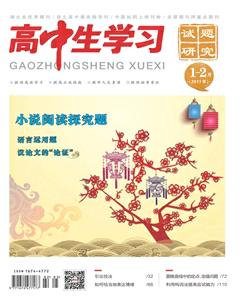如何掌握虚拟语气
李晋华 周方方
虚拟语气是高考考纲要求掌握的内容。高考主要考查虚拟语气在if引导的非真实条件句、名词性从句和其他一些句子中的应用。同学们应重点掌握非真实条件句中的主、从句谓语的对应关系,牢记哪些词后的名词性从句需要使用虚拟语气。
[虚拟语气的使用范围]
虚拟语气用来表示说话人所说的话并不是事实,而是一种假设、愿望、怀疑或推测,主要用于if条件状语从句中,也可用于主语从句、表语从句和宾语从句等。
[虚拟语气用于if条件句]
if条件状语从句有真实条件句和非真实条件句。假设条件可以实现的句子是真实条件句,反之则为非真实条件句,要用虚拟语气。其形式分为以下三种:
1. 条件从句与现在事实不一致,其句型为:if+主语+过去时,主语+should(could,would,或might)+动词原形。如:
If I were in your position, I would marry her.
2. 条件从句与过去事实不一致,句型为:if+主语+had+过去分词,主语+should (could,would,或might)+have+过去分词。如:
If it had not rained so hard yesterday, we could have played tennis.
3. 条件从句与将来事实不一致,句型为:if+主语+should/were to(过去时)+do,主语+should(could ...)+原形do。如:
If you should miss the chance, you would feel sorry for it.
If the sun were to rise in the west, I would lend you the money.
例1 If I it with my own eyes, I wouldnt have believed it.
A. didnt see B. werent seeing
C. wouldnt see D. hadnt seen
解析 D。句意:如果不是亲眼看到,我不会相信。根据后半句wouldnt have believed可知是对过去的虚拟。
4. 省略形式。有时可以把含有助动词、情态动词、be动词的虚拟条件句中的连词if省去,将had,should,were等词提到主语之前,即用倒装结构。这时,如果出现not等否定词时需放在主语后面。例如:
Had the doctor come last night, the boy would have saved.
Were I to go to the moon one day, I would see it with my own eyes.
Should it rain tomorrow,we would stay at home.
Had it not been for your help, I wouldnt have succeeded.
例2 no modern telecommunications, we would have to wait for weeks to get news from around the world.
A. Were there B. Had there been
C. If there are D. If there have been
解析 A。句意:要不是有了现代化的电讯设备,我们要等几个星期才能知道世界各地的新闻。根据主句的时态可知是与现在事实相反的情况。
5. if only常用来引导省略主句的虚拟条件句。这种条件句常表示不可能实现的愿望,也用于表示与事实相反的愿望,虚拟语气的时态与wish后所接时态的规则相同。如:
If only he would find a satisfactory job after his graduation. (与将来事实相反)
If only my mother had survived the disease. (與过去事实相反)
If only I were better looking. (与现在事实相反)
[混合虚拟条件句(错综虚拟条件句)]
有时候,条件从句和主句动作发生的时间是不一致的(如一个是过去发生的,一个是现在发生的),这时动词的形式要根据表示的时间来调整。如:
If I had followed the doctors advice, I would be better now.
If I were you now, I would have chosen to take a job.
例3 If he had spent more time practicing speaking English before, he able to speak it much better now.
A. will be B. would be
C. has been D. would have been
解析 B。句意:要是他以前多花点时间练习英语,他现在就能说得很好了。本题考查混合式虚拟语气。从句时间是before,可知与过去事实相反,用过去完成时;主句时间是now,与现在事实相反。
例4 If it (be) for his invitation the other day, I should not be here now.
解析 had not been。句意:要不是因为前几天他的邀请,我现在就不会在这里了。本题考查混合式虚拟语气。从句时间是the other day,表示与过去事实相反,用过去完成时;主句时间now表示与现在事实相反。
[含蓄虚拟条件句]
有时一个假设的情况并不用条件从句表示,而用其他方式来表示,这样的句子叫含蓄条件句。主要有以下几种情况。
1. 用with,without,but for等介词短语来替代条件从句,它们都可以转换成由if引导的虚拟条件句。如:
Without/But for the sun, nothing would grow.
= If it were not for the sun, nothing would grow.
例5 Without his wartime experiences, Hemingway his famous novel A Farewell to Arms.
A. didnt write B. hadnt written
C. wouldnt write D. wouldnt have written
解析 D。句意:没有他的战时经验,海明威就不可能写出著名的小说《永别了,武器》。根据without his wartime experience(没有战时的经历),可知这里表示与过去事实相反的猜测,故主句用would have done。
2. 用or,otherwise,but等引导的虚拟语气。如:
You didnt come yesterday,or you would have seen him.
I was very busy last week,otherwise I would have come to see you.
例6 It is lucky we booked a room,or we , nowhere to stay now.
A. had B. had had
C. would have D. would have had
解析 C。句意:我们很幸运地订到了房间,否则,我们现在就会无处可去了。or引导含蓄虚拟条件句,or后面是主句,相当于If we hadnt booked a room,we would have nowhere to stay now。根据“now”可知是对现在进行虚拟,故选C。
例7 I to my cousins birthday party last night, but I was not available
A. went B. had gone
C. would go D. would have gone
解析 D。句意:我原本想去参加表弟昨晚的生日晚会,但是我没有时间。根据后半句but I was ...可知真实时态是一般过去时,与过去事实相反,前半句相当于If I had had time,I would have gone to ...。
[as if/though引导的方式状语从句或表语从句]
1. as if从句用陈述语气的情况:当说话者认为句子所述为真实的或极有可能发生/存在的事实时。如:
It looks as if it is raining.
2. as if 从句用虚拟语气的情况:当说话人认为句子所述的是不真实的或极少有可能发生/存在的情况时。从句虚拟语气动词的时态有如下几种情形:
(1)如果从句表示与现在事实相反,谓语动词用一般过去时。如:
You look as if you didnt care.
(2)从句表示与过去事实相反,谓语动词用“had+过去分词”。如:
He talks about Rome as if he had been there before.
(3)从句表示与将来事实相反,谓语动词用“would/could/might+动词原形”。如:
He opened his mouth as if he would say something.
例8 It was John who broke the window. Why are you talking to me as if I it?
A. had done B. have done
C. did D. am doing
解析 A。句意:是約翰打破了窗户,为什么你说得像是我做的?从前半句可以看出与过去事实相反。
[宾语从句中的虚拟语气]
1、wish后接宾语从句中的虚拟语气:
主语+wish+(that)+主语+did/were(与现在情况不一致)
主语+wish+(that)+主语+had done(与过去情况不一致)
主语+wish+(that)+主语+would+v.(与将来情况不一致)
如:I wish that I met my uncle now.
I wish I had met my uncle yesterday.
I wish I could meet my uncle tomorrow.
例9 I wish I at my sisters wedding last Tuesday,but I was on a business trip in New York then.
A. will be B. would be
C. have been D. had been
解析 D。上周二我本希望参加我姐姐的婚礼,但那时我在纽约出差。本题考查wish引导的宾语从句,表示与过去事实相反的愿望,用“had+过去分词”。
2. 表示“要求、建议、命令”等动词后面的宾语从句中的虚拟语气。从句的谓语动词用“should+动词原形”,其中should可以省略。
当insist表示“坚持认为”,suggest表示“表明,显示”时,不用虚拟语气。如:
Bill insisted that Mike (should) apologize to his father, but Mike insisted that he was right.
His pale look suggested that he was in poor health. So I suggested that he (should) have a good rest at home.
例10 Eye doctors recommend that a childs first eye exam at the age of six months old.
A. was B. be C. were D. is
解析 B。句意:眼科医生建议孩子的视力检查应该在六个月的时候进行。recommend表示建议,其宾语从句用虚拟语气should do,should可以省略。
3. would rather后的宾语从句要用虚拟语气,一般用过去时态表示与现在或将来事实相反,用过去完成时表示与过去事实相反,如:
I would rather you went home now. (与现在事实相反)
Dont come tomorrow. Id rather you came next week. (与将来事实相反)
Id rather you hadnt done that yesterday. (与过去事实相反)
例11 We would rather our daughter ________ at home with us, but it is her choice, and she is not a child any longer.
A. would stay B. has stayed
C. stayed D. stay
解析 C。句意:我们宁愿我们的女儿和我们住在一起,但是这是她自己的选择,她已经不是一个孩子了。从后面一句的is可知真实的时态是一般现在时,would rather后面的宾语从句要用虚拟语气,表示愿望与现在事实相反,故答案选C。
[主语从句中的虚拟语气]
(1)It be+形容词+that ... (should) do ...
Its necessary/important/strange/surprising/natural ...that ...表达了说话人的命令、要求、建议或者惊讶,从句中应用should+do,其中should可省略。
Its natural that he (should) feel hurt.
Its necessary that you (should) work out every day to keep fit.
(2)It be+过去分词+that ... (should) do ...
用于該结构中的过去分词是表示“建议、请求、命令”等词的过去分词,如desired,suggested,requested,ordered,proposed等。
It is desired that the building of the house be completed next month.
(3)It is (about/high/quite) time that ...+(过去时/should+动词原形) ...
It is high time I went/should go home now.
[表语从句、同位语从句中的虚拟语气]
在suggestion,proposal,order,plan,idea,advice,decision等需要具体内容解释的名词后要使用虚拟语气,其谓语动词为:should+do,连接从句的that不能省略。如:
The suggestion that he be invited was rejected. (同位语从句)
That is their demand that their wages be increased. (表语从句)

